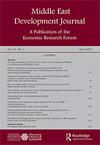On the unfinished business of stabilization programs: a CGE model of Egypt
IF 0.9
Q4 DEVELOPMENT STUDIES
引用次数: 0
Abstract
ABSTRACT Several emerging economies have embarked on structural adjustment reform programs that focused more on short-run-oriented stabilization reforms. Yet, longer-term structural policies that can shift their potential GDP were not fully taken into consideration. Thus, this paper contributes to the literature in three ways. First, we contrast the effects of stabilization and allocation policies in order to examine to what extent they complement or substitute each other. Second, we analyze how the effects of such policies can differ in the short and long term and with different market structures (perfect vs. imperfect competition). Third, we develop a CGE model for Egypt that was subject to a recent reform program developed with the IMF. Our main findings show that stabilization reforms reduce economic growth by 2.5% in the short run. Yet, they positively affect it over time especially if they are accompanied by structural reforms. Indeed, the latter increase economic growth (of 8.6% in the long run). Furthermore, from a social perspective, stabilization reform deteriorates households’ welfare in the short run. Finally, we find that negative effects of stabilization and structural reforms are more pronounced under imperfect competition pointing out the importance of an effective competition policy.论稳定计划的未完事业:埃及的通用电气模式
一些新兴经济体已经开始实施结构调整改革计划,这些计划更多地侧重于短期导向的稳定改革。然而,能够改变潜在GDP的长期结构性政策并未得到充分考虑。因此,本文对文献的贡献体现在三个方面。首先,我们对比了稳定政策和分配政策的效果,以检验它们在多大程度上相互补充或替代。其次,我们分析了这些政策在短期和长期以及不同市场结构(完全竞争与不完全竞争)下的影响。第三,我们为埃及开发了一种CGE模式,该模式受国际货币基金组织最近制定的一项改革计划的约束。我们的主要研究结果表明,稳定改革在短期内会使经济增长率降低2.5%。然而,随着时间的推移,它们会产生积极的影响,尤其是如果它们伴随着结构性改革的话。事实上,后者促进了经济增长(长期增长率为8.6%)。此外,从社会角度来看,稳定改革在短期内恶化了家庭福利。最后,我们发现在不完全竞争条件下,稳定化和结构性改革的负面效应更为明显,这表明有效竞争政策的重要性。
本文章由计算机程序翻译,如有差异,请以英文原文为准。
求助全文
约1分钟内获得全文
求助全文

 求助内容:
求助内容: 应助结果提醒方式:
应助结果提醒方式:


